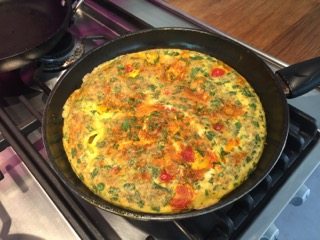Lots of us start the New Year with all kinds of good intentions regarding our diet and it’s amazing how quickly we fall back into our old habits. What you eat and when you eat has a big impact on our general health on a daily basis affecting our energy levels, mood and ability to think and function properly.
The subject of breakfast is a controversial one ….. some nutritionists swear that it’s the most important meal of the day whereas others recommend missing out and making your first meal a bit later on.
My advice – as always – is listen to what your body is telling you. Do you wake up hungry? Then satisfy that hunger and help raise up your blood sugar levels. If you don’t, then wait a little later until you’re ready to eat. Do make sure that you are hydrated so starting the day with hot water and lemon juice or a herbal tea is a good choice.
I think the most important rule here is to make sure your first meal of the day – regardless of the time – is a nutrient dense feast to feed your body and mind and give you sustainable energy.
So here are a few ideas that will help give you energy and avoid fatigue without raising insulin levels and setting you on the path of endless snacking.
All of these ideas contain good amounts of protein, fibre and beneficial fats and where there is carb these are a source of natural rather than refined sugars.
- A small handful of whole oats or buckwheat flakes (25g max) that have been soaked overnight in water, dairy or alternative milk. After cooking, add a tablespoon of mixed seeds (pumpkin, sunflower, chia and flax) that have either been crushed or soaked overnight in water and then drained. (You could choose a milled version such as Linwoods available in all supermarkets). Serve with plain, bio full fat yoghurt and a few berries (either fresh or frozen). You could also add some toasted coconut flakes.
- You can use ground cinnamon to flavour the oats (make sure you source Sri Lankan ‘true’ cinnamon rather than cassia bark which is often sold as ‘cinnamon’)
- Alternatively you can eat this raw which is more like a ‘bircher’ type muesli. This is especially good if you soak the oats in either natural yogurt or milk kefir- a fermented milk drink that is packed full of good bacteria.
- If you’re ok with wheat and gluten – 1 slice of pumpernickel rye bread or good quality sourdough and spread with ONE of the following options:
- 1 dessertspoon nut butter (peanut, hazlenut, almond etc). Make sure you buy a sugar free one such as Meridian or Carley’s
- 1 leaf of smoked salmon with lemon juice and slices of cucumber
- 1 dessertspoon soft cheese (per slice) eg cottage, goats or sheeps, and serve with cucumber and 3 cherry tomatoes
- 1 dessertspoon of hummous or other bean dip (per slice) and serve as above
- Adding in vegetables /green leaves/salads helps you increase your intake of fibre
- 1-2 eggs either boiled, poached, made into an omelette or scrambled served with:
- 1 leaf of parma ham, or
- 1 leaf of smoked salmon or
- 1 rasher of good quality bacon. Try to get nitrate free bacon such as Finnebrogue Naked unsmoked bacon (available in supermarkets)
And if you wish add:
- 2 poached plum tomatoes
- 2 tablespoons of sauteed mushrooms
- a portion of steamed spinach
- Fruit salad made with stewed rhubarb or plums (try not to add too much sugar – you can use the juice of an orange or add a teaspoon of good quality honey or maple syrup. Also nice to stew the fruit with a cinnamon stick and/or a star anise.
And if you wish add:
- a tablespoon of mixed seeds (pumpkin, sunflower, chia and flax) that have either been crushed or soaked overnight in water and then drained (or Linwoods).
- You may also add up to 6 nuts that have been soaked (like the seeds) or chopped up.
- 2 tablespoons plain, bio yoghurt (dairy if tolerated or a coconut milk yogurt)




